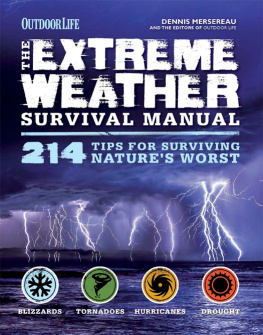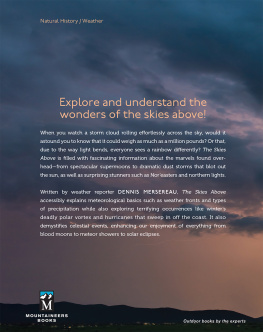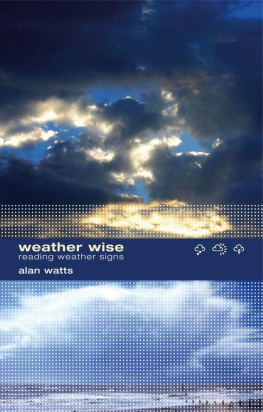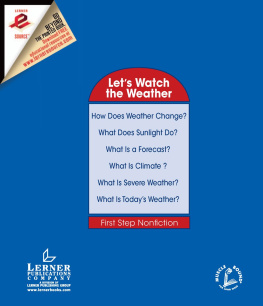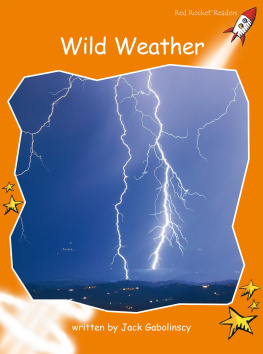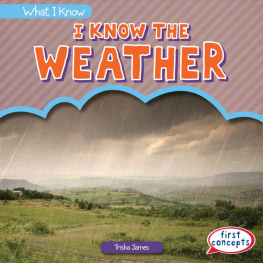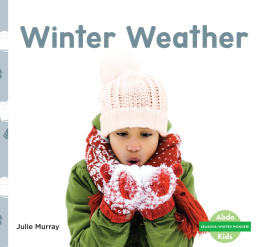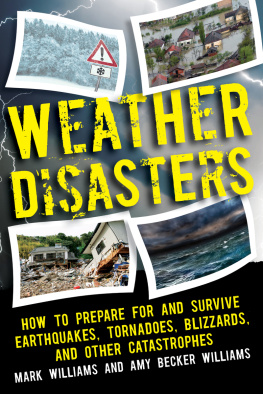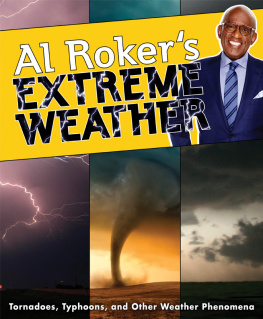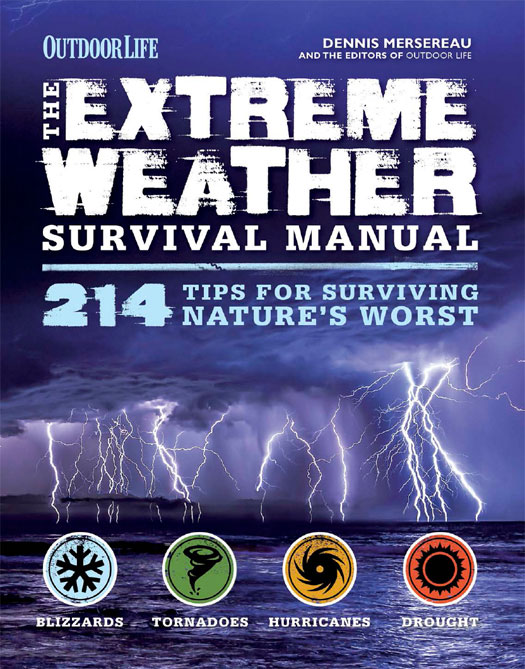
DENNIS MERSEREAU
WITH ROBERT F. JAMES AND
THE EDITORS OF OUTDOOR LIFE



INTRODUCTION
W eather is the most spectacularly beautiful and destructive force on Earth. The same atmosphere that can dazzle us with a serene, vivid sunset in one town can simultaneously wipe the neighboring town off the map in a violent fury. Meteorology, or the study of weather, is a fascinating topic that covers almost every aspect of our atmosphere, from the patches of frost on your front lawn to storm systems that stretch across entire continents.
Weather is as terrifying as it is awe-inspiring, and it can take some quick thinking and clever skills to survive the elements. One of the greatest advancements we have made as a civilization is the development of weather forecasting, which has advanced over the years to an incredible degree of accuracy. Every day, tens of thousands of meteorologists around the world provide spot-on forecasts that help people from all walks of life figure out what they should wear or what they need to do to save their lives.
This book will cover most of the major weather phenomena we experience on a daily basis, breaking down each type of weather by the season in which it most commonly occurs. You will learn about blizzards, ice storms, and even the much-feared and misunderstood polar vortex in the Winter chapter, while the Spring chapter holds vital information about severe weather such as tornadoes, hail, and lightning. You will quickly see that weather events are not strictly confined to a specific seasontornadoes can and do occur at any time of the year in the United States, for instancebut they fit in our seasonal boxes pretty well.
In the Summer chapter well talk about hurricanes and floods, as well as heat waves and deadly droughts. And what about Fall? The funny thing about fall is that, well, theres not really much there there. The first half is dominated by the last gasps of summer, with oppressive heat and the destructive wildfires that so often follow. The second half is characterized by the ominous sense that, as they say, winter is coming.
We close out the book with some of the wackier side of weatherinteresting conspiracies, wild conjectures, and things you probably never even thought to asklike, do volcanoes cause weird weather?
My goal with this book is to make you fall as much in love with the weather as I have over the years. There is so much more to the weather than fodder for small talkeven the calmest day of blue skies and bright sunshine is exciting if you look just beneath the surface.

FROM OUTDOOR LIFE
H umans dont share much. As a species, we are solitary keepers. Except for a brief time in college (or the military, or the Burning Man event in Nevadas desert), we keep our own households, separate from the rest of our tribe. Despite every effort of Facebook, we keep our own memories, our own things, even our own histories.
But what we share, often spectacularly and usually with personal anecdote, is the weather. It unites us more than languages or cultures do, and the more extreme the weather, the more it galvanizes those of us who live with it, and through it.
This is a book about the most unifying force on earth: catastrophic weather. But its only not a worst-case survival manual that may save your life. Its also a lively textbook that will make you smarter. Author Dennis Mersereau is determined to teach you about the weather, and with that education, to better appreciate the awesome power and beauty of the elements behaving badly.
This book will teach you how to read a television weather map, but also how to anticipate the path of a killer tornado. It will teach you which lightning is harmless, and which might light you up like a Roman candle. It will teach you how to minimize the impacts of crippling drought, and how to explain the jet stream and the El Nio effect at your next cocktail party.
Mersereau is the perfect guide to this troubled world of unstable weather. Hes a self-described weather geek who grew up in the American South, where freak storms and unexpected blizzards were part of the landscape.
Now, Mersereau is one of a new breed of weather nerds who arent network meteorologists or employed by the National Weather Service, but who enlarge our understanding of the weather as internet bloggers. And hes one of the best, routinely identifying and quashing weather-related nonsense that often goes viral and contributes to our collective misunderstanding of the weather.
This book is the antidote to that sort of crowd-sourced ignorance. Its smart. Its useful. And its real. Because no matter whether you live in Alabama or Armenia, you will at some point have to deal with flooding, and with drought, with killer storms and with ominous-looking clouds. Youd better know how to drive on black ice, and how to survive in a snowbound car if you go off the road.
There are hundreds of tutorials between these covers that will save your life or enlarge your understanding of our world. Both are useful. Because if you make it through that big storm, you are going to talk about it. You cant help it. You are human, and one of the only things you cant keep to yourself is your experience with our weather.
Andrew McKean
Editor-in-Chief, Outdoor Life
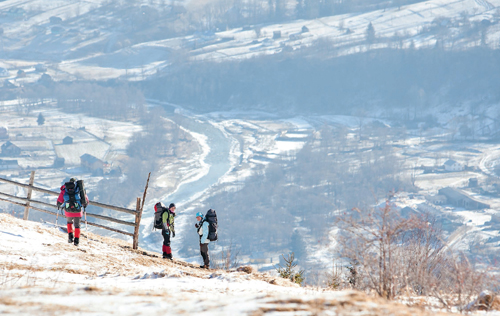
MEET THE WEATHER
The weather is strange in that it is seen as both personal and impersonal. Each weather event can affect our lives in the most profound ways, yet these deeply personal impacts are not at all unique. The weather plays a formative role in the lives of every person who currently lives, has ever lived, or ever will live, and it will keep doing so until we cease to exist or pack up and move to another planet. Understanding our powerful and fragile atmosphere is important not only because it affects our lives, but also because its just darn cool. So bear with me while I get really nerdy for a bit.
LEARN THE LANGUAGE It seems elementary, but in order to fully understand the weather, we need to understand the terms used to talk about different weather events. Weather happens at three scalessynoptic, mesoscale, and microscale. Synoptic-scale meteorology deals with large systems such as hurricanes, noreasters, and frontscold, warm, stationary, and so onthat can have an effect on nations or even entire continents. Mesoscale meteorology deals with smaller weather events such as squall lines, clusters of thunderstorms, lake-effect snow, and sea breezes. Microscale meteorology involves weather that occurs on a local basis, such as winds and clouds interacting with individual mountains, cold air draining down into a dip in the terrain, and even dust devils that spin up over a hot parking lot.

